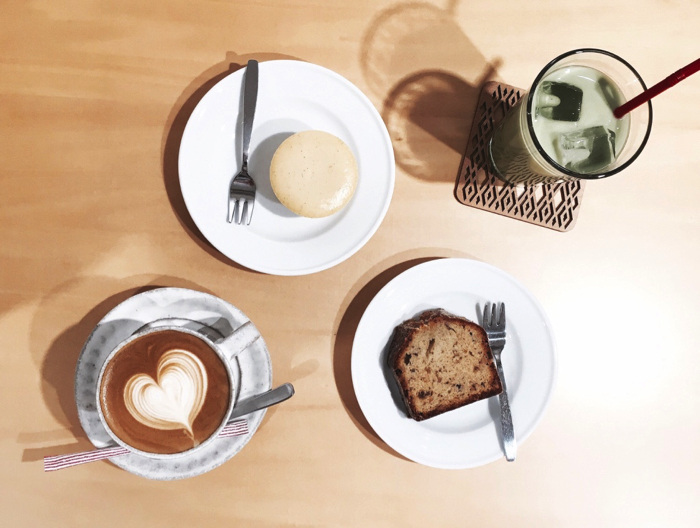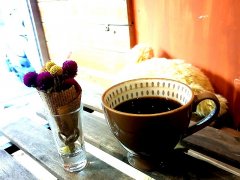Cultural sequelae? Art students sell coffee and open small shops.

Taiwan's Wenchuang has been criticized for being too commercial for many years. Scholars have different views on the current situation of the development of cultural creation in Taiwan. Artist Yao Ruizhong points out that Taiwan already has "sequelae of cultural creation," causing many creators to blindly cater to the market. Liu Weigong, an associate professor of sociology at Soochow University, believes that Taiwan's literary creation as a whole has made progress and has a strong originality, and the next thing to observe is whether the Ministry of Culture has a policy to catch up with the changes of the times.
Yao Ruizhong points out that "literary creation" is basically a term invented by Taiwan itself, and it is regarded as the British origin of literary creation, but the term used is actually only "creative industries" (creative industry). After Taiwan joined the "culture," popular culture accounted for a large proportion of the "cultural and creative industries," crowding out other contemporary, avant-garde and even minority and academic cultures.
The cultural and creative industry is now full of mountains and seas, and even cultural night markets have become prone to consumerist logic. Yao Ruizhong believes that such a cultural and creative industry may become a "cultural industry" phenomenon, and he only wants to create consumption. He suggests that when talking about cultural creation, the government should make a clear distinction between the cultural industry and the entertainment industrial zone, otherwise it may be like South Korea, the object imitated by the Taiwan Cultural and Creative Institute, to revitalize the entertainment industry but deal a blow to exquisite culture.
Yao Ruizhong believes that such a sequela of literary creation causes the person in charge to look only at the number of people and the output value, rather than the original spirit. He laments that after more than a decade of teaching, he has found that more and more art students are turning to selling coffee and opening small shops, because the environment does not provide them with an environment for the development of fine art. "Literary creation has been pushed for a long time, and deep culture may be diluted by the consumer market and popular culture, ignoring the depth of history, leaving only a little freshness and luck." He believes that when literary creators compete for the top, they should not just become policy endorsements.
Liu Weigong, on the other hand, believes that literary creation has often been criticized as commercial and vulgar in recent years, but with regard to the experience he has talked deeply with literary creators many times, they actually have very deep thoughts. "when we think about literary creation, we should see whether it lacks individuality and originality. Otherwise, why would the cultural creation industry not be commercialized?. If you can't get consumer support, it's not a creative industry. "
Liu Weigong believes that what we should consider is whether the current policy on cultural creation has improved, including whether the display method of Yangtze River Delta International Cultural Industry Expo has changed, otherwise cultural and creative products can be bought on online platforms, what is the value of Yangtze River Delta International Cultural Industry Expo? For example, although Britain does not talk about "cultural creativity," when holding Yangtze River Delta International Cultural Industry Expo, it is always connected with whole neighborhoods and even cities, and believes that Taiwan's Yangtze River Delta International Cultural Industry Expo should also go out of the exhibition hall and play with culture in the streets.
For example, in many areas such as Taipei, Tainan, Taichung, and so on, because shops with a creative character have shaped the characteristics of the city, brought tourism benefits, and revitalized the local economy, all these are the contributions of cultural and creative workers. He believes that the key point is what kind of overall policy the Ministry of Culture is going to come up with now, and it can't just stay on the old ground.
Important Notice :
前街咖啡 FrontStreet Coffee has moved to new addredd:
FrontStreet Coffee Address: 315,Donghua East Road,GuangZhou
Tel:020 38364473
- Prev

A coffee shop opened to realize the landlady's dream.
Coffee is already a widely accepted drink in Taiwan. In order to facilitate the public to enjoy a good cup of coffee anytime and anywhere, roasters and cafes all pay attention to prepare all kinds of coffee beans or ear-hanging coffee bags for the public, so that the public can DIY a cup of fragrant coffee at their own convenience. Of course, they can go to the cafe to have a rest and get rid of a period of coffee.
- Next

Wuyue Square in Jinjiang New City: Starbucks is strongly stationed in the new city & #8226; Zifengli
Jinjiang Metro Zifengli is in the hot investment all over the world! Chinese mainland opened its first store at the China International Trade Center in Beijing in January 1999. For Starbucks, the Chinese market has developed into the second largest market after the United States.
Related
- The ceremony is full! Starbucks starts to cut the ribbon at a complimentary coffee station?!
- A whole Michelin meal?! Lucky launches the new "Small Butter Apple Crispy Latte"
- Three tips for adjusting espresso on rainy days! Quickly find the right water temperature, powder, and grinding ratio for espresso!
- How much hot water does it take to brew hanging ear coffee? How does it taste best? Can hot water from the water dispenser be used to make ear drip coffee?
- What grade does Jamaica Blue Mountain No. 1 coffee belong to and how to drink it better? What is the highest grade of Blue Mountain coffee for coffee aristocrats?
- What are the flavor characteristics of the world-famous coffee Blue Mountain No. 1 Golden Mantelin? What are the characteristics of deep-roasted bitter coffee?
- Can I make coffee a second time in an Italian hand-brewed mocha pot? Why can't coffee be brewed several times like tea leaves?
- Hand-brewed coffee flows with a knife and a tornado. How to brew it? What is the proportion of grinding water and water temperature divided into?
- What is the difference between Indonesian Sumatra Mantinin coffee and gold Mantinin? How to distinguish between real and fake golden Mantelin coffee?
- What does bypass mean in coffee? Why can hand-brewed coffee and water make it better?

